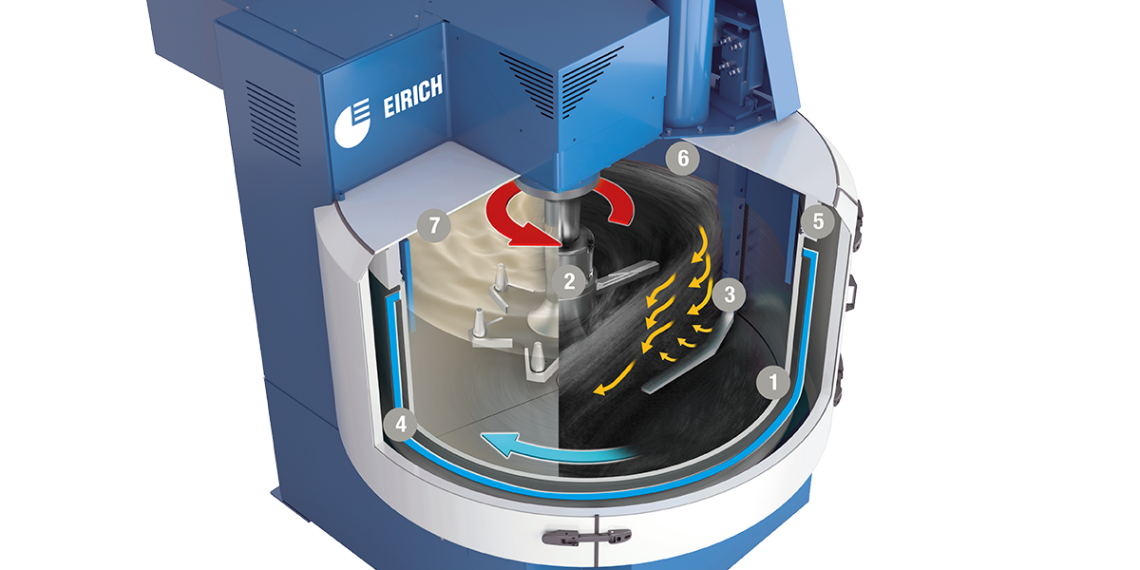Eirich MixSolve are convincing in the production of electrode mixtures from the laboratory to the Gigafactory. The ContiFeeder process ensures a continuous coater supply. Eirich will provide information about the future-proof solutions for lithium-ion batteries at the Battery Show Europe 2021 in Hall 8, Booth 126.
The production of electrode mixtures for lithium-ion batteries is one of the most demanding tasks in the field of mixing technology. Currently, slurries are predominantly used for coating the electrodes. The mixing quality in the production of these slurries has a direct influence on their processability and cell performance.
Ideal from laboratory scale to Gigafactory
The Group thus offers an intensive mixer that is optimized specifically for this application. Solutions are available from laboratory scale with a few 100 ml up to a throughput of 1,000 l / h per mixer. The product differs from conventional mixing systems, e.g. planetary mixers, by its rotating mixing vessel with the mixing tool arranged eccentrically inside. This is optimally matched to the process engineering task in terms of its geometry and speed. “With the MixSolver, we can excellently control which shear forces we apply in the different preparation phases.
This gives us optimal possibilities to influence the properties of the slurries. Ultimately, our customers benefit from higher solids contents and particularly powerful batteries,” explains Dr. Stefan Gerl, head of process engineering. Another advantage is that the slurry quality can be kept identical even if the throughput rate is increased, since only the filling level is increased or the idle times are reduced. This simplifies scale-up and increases flexibility immensely.
Fast and energy-efficient to the perfect slurry
The MixSolve enables a process that results in optimally dispersed electrode slurries in 15–20 minutes. In the first step, all dry components (active materials, conductive carbon black, binders and additives) are intensively dry-mixed. After adding a sufficient quantity of the solvent, a plastic mass is initially formed by kneading, which ultimately has a decisive influence on the slurry quality. The kneading mass is subsequently thinned to the desired viscosity.
“With an energy consumption of about 16 Wh per liter on production machines and exceptionally high solids contents, we achieve an absolute top value compared to all other processes for the production of electrode slurries.”
- Dr. Stefan Gerl
During or after the mixing process is completed, a special measuring procedure with the mixing tool enables inline viscosity measurement for quality control, so that only slurries within the tolerance bands specified by the customer are removed from the mixer. For directly degassed slurries, the mixer is equipped with EvacMix technology. The rotating mixing vessel is then surrounded by a tightly enclosed pressure vessel, which allows degassing of the electrode mixture superimposed on the mixing process. The company also offers the MixSolver with a double jacket for a temperature-controlled process and with explosion protection.
Optimal for just-in-time supply of coaters with EIRICH ContiFeeder
EIRICH meets the demand for a high-performance system that is directly connected to the coating line with the ContiFeeder process. As with production in the extruder, the electrode mixture is emptied into a slurry tank assigned to the mixer after the mixing process. Here, additional degassing, temperature control and quality control can be carried out by in-line sensors or sampling. If, after this more intensive quality control, the batch is exceptionally defective, it can easily be discharged from here without negatively affecting the slurry stored in the buffer tanks. In plants with high throughput rates, further buffer tanks are added as intermediate storage.
From the latter, the coater(s) are continuously supplied with slurry. This allows users to benefit from the better quality control possibilities of a batch process and at the same time from the advantages of a continuous coater supply. “The trend towards inline process control and the desire for IoT, we take into account with our QualiMaster LiB system for quality assurance and process optimization,” emphasizes Dr. Stefan Gerl. This builds on the Qualimaster quality system for foundry molding materials, which has been tried and tested for decades and is in use worldwide. “With it, several hundred values are permanently measured, recorded and made available for MES systems.”
On the rise: dry-processed electrodes
LiB technology will continue to develop in the coming years. With its high flexibility in terms of raw materials and processing routes, EIRICH process technology enables trouble-free and rapid adaptation to all battery raw materials, recipes and processing forms. Dr. Stefan Gerl expects the development to move toward dry-processed electrodes in the coming years. “This is not a problem for us: the functional principle of the intensive mixer is excellently suited for the production of structured electrode dry mixes — only the mode of operation and some operating parameters have to be adapted compared to electrode slurries,” says Dr. Gerl. Accordingly, Eirich customers no longer need to replace the mixer if processes or formulations are changed in the future.

















